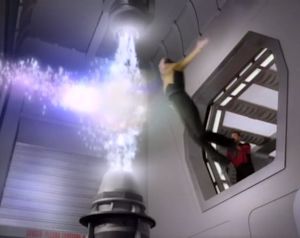| |||||||||||
| |||||||||||
|
Spoiler-free notes: Another good hook. Suicide has come up on TNG in the past (ritual suicide in "Half a Life" and "Ethics", and off-screen suicides in "The Defector" and "Suspicions," not to mention the occasional decision to blow up the Enterprise), but never has it been shown with such drama and graphic inventiveness. Right off the bat, the audience knows we're in for something unique. In this episode, and in "The Pegasus," there is a hand-waving line about authorization "to exceed warp speed limitations," which is an obvious reference to "Force of Nature," the episode in which such limitations are introduced. However, it seems to be more of a plot inconvenience than anything else, and its lack of real impact thus far only serves to weaken the message of "Force of Nature." If there were an episode in which that limitation presented difficulty--forcing Picard to choose between following the limitation and doing something he needs to do--the moral would have more resonance. Data's discussion of his own decision not to terminate himself in his youth is a clever, metaphorical way of addressing the difficult subject of suicide. For a writer, it's hard to talk about suicide without coming across as preachy, cliché, or insensitive, but the relatively brief discussion between La Forge and Data nails it. Unfortunately, for the next ten minutes after that, the writers get a little too heavy handed and take far too long to move on. "It's not like Dan to take his own life." That's just stupid. Suicide is not a bad habit that you can commit several times. When looking through the faces of crewmembers who served at Utopia Planetia and on the Enterprise, Troi comes across the image of Lieutenant Pierce and announces that she remembers him coming on board six months ago. Why would she remember that, when the real Pierce killed himself eight years ago? I thought human women were too delicate and fragile to have sex with a Klingon male. Granted, the whole thing is happening in Troi's head. It is pretty cool to see the inside of a nacelle tube. With the telepathic inhibitor, Troi acts only mildly annoyed by her inability to sense others, but in "The Loss," she is far more debilitated and traumatized from losing her telepathic sense. This episode has the potential to be interesting and disturbing, but a few things go wrong. First of all, the climax is ludicrously rushed, such that it is impossible to sell the idea that Troi would so willingly commit suicide. This is important, because it's what the episode is betting on. The story is clearly designed around answering the question: what would it take for an otherwise stable person to consider suicide? Also, it hinges on Troi's relationship with Worf, which has only been hinted at thus far and not truly explored yet. Thus, the narrative has to rush through not only Troi's escalation to suicide but also through the opening stages of a new relationship, and it's simply too much to ask for out of a single hour. (As a side note, I've never personally understood the Worf/Troi romance; it has always felt contrived and clumsy to me.) Plus, the "science" underneath it--with all the "empathic echoes," "psychic imprints," and "psionic resonance"--is just way too silly, obviously created to justify a haunted house tale, complete with bones hidden behind the walls. It's nowhere near as bad as "Sub Rosa," but it's still a little weak. However, the episode does do many things right, and it succeeds in giving off a trippy, creepy vibe. It's clear what the writers were trying to accomplish, but I think they ran out of time to get it right, resulting in a final product that could have been delicious if only they'd been able to finish cooking it. Number of episodes in which a crewmember is subverted by an alien lifeforce: 31. | |||||||||||
|
| |||||||||||
| |||||||||||
|
Copyright ©2013 e. magill. All rights reserved.
|

